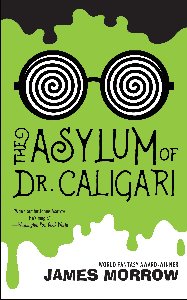Paul Di Filippo reviews K.J. Parker and James Morrow
Mightier Than the Sword by K. J. Parker (Subterranean 978-1-59606-817-9, $40, 136pp, hardcover) June 2017
The Asylum of Dr. Caligari by James Morrow (Tachyon Publications 978-1-61696-265-4, $14.95, 184pp, trade paperback) June 2017
 It seems pretty nigh inarguable that novellas are hot right now. Long esteemed as the perfect mode for fantastika–since they allow for plentiful world-building, depth of characterization and density of plot, while still being a relatively quick snack rather than the outsized banquet of a bug-crusher or a trilogy—novellas have found favor with publishers as well as readers. Part of their ascendency is also due to extra-literary reasons: congenial ebook and marketplace parameters.
It seems pretty nigh inarguable that novellas are hot right now. Long esteemed as the perfect mode for fantastika–since they allow for plentiful world-building, depth of characterization and density of plot, while still being a relatively quick snack rather than the outsized banquet of a bug-crusher or a trilogy—novellas have found favor with publishers as well as readers. Part of their ascendency is also due to extra-literary reasons: congenial ebook and marketplace parameters.
Whatever has given this format its moment in the spotlight, we readers must rejoice. Especially with two fine examples such as the ones under discussion here.
Having been revealed as Tom Holt, “K. J. Parker” continues to produce his own distinctive style of story, much like Kit Reed or Joyce Carol Oates or John Banville with their alternate identities. This time around, Parker has delivered a spry, cynical, whimsical tale that combines the Howardian savageries he is known for with the breezier stylings of Holt’s comedies. A certain Wodehousian flavor is evident right from the start when we realize we are about to hear the account of a somewhat idle, somewhat foppish, but surprisingly lucky and smart nephew who is acting at the behest of a domineering aunt.
The aunt happens to be the sovereign of the Empire of the Robur (great use of that Vernean proper name, as well as all other cognomens), and her nephew is the heir apparent, our narrator. (We never learn their exact appellations, rendering these personages rather symbolic, atop their colorful individuation.) She commissions the young fellow to track down the barbarian raiders who are despoiling the various monastery communities, all of which center on their libraries. This conceit makes this book one of those somewhat rare bibliocentric fantasies, of which I’ll name just Vernor Vinge’s Tatja Grimm’s World.
And so off our boy goes, embarking on an exotic odyssey of chicanery, realpolitik, warfare, and eventual marriage to his favorite beloved prostitute. Combining Tom Jones-style picaresque with a genuine mystery McGuffin–who is behind these raids, and what do they want?–the tale offers surprises, laughter, shocks and epigrammatic flair. Parker substantiates his subcreation with a vivid backstory that covers more than a thousand years, and the bookish aspect of the tale remains central without being domineering or mawkish.
Our hero’s self-assessment will ring true to most of Parker’s audience. “Anyone who reads the right book has an ally, an advisor who’s far more clever than he is and can tell him what to do. I have a box of books that goes with me everywhere… Accordingly, I’m damned if I’m going to let the accumulated wisdom of the past perish from the face of the earth…”
Certainly this delightful frolic, composed of dark and light segments in equal measure, is a prime candidate for anyone’s box of literary treasures.
…
 Having done such a delightful job with his previous short novel, The Madonna and the Starship (reviewed in this very venue) James Morrow continues his foray into compactified fables with a book that riffs on a very famous film, The Cabinet of Dr. Caligari. Thus, like Parker’s book, it finds inspiration for a new tale in contemplation of the glories of an extant tradition.
Having done such a delightful job with his previous short novel, The Madonna and the Starship (reviewed in this very venue) James Morrow continues his foray into compactified fables with a book that riffs on a very famous film, The Cabinet of Dr. Caligari. Thus, like Parker’s book, it finds inspiration for a new tale in contemplation of the glories of an extant tradition.
Also like the Parker book, this tale derives power from the idiosyncratic first-person narration. Our hero in this case is one Francis Wyndham, a fair-to-middling young artist without much of a career. The year is 1914, just before the outbreak of WWI, and Wyndham sets off to Europe to seek painterly fame and fortune. But he gets nowhere, and, down to his last franc, he takes a job as therapeutic artist-in-residence at the Träumenchen sanitarium run by one Alessandro Caligari. Once ensconced there (and told he may not leave the grounds till his employment is terminated, one way or another), Wyndham is quickly introduced to the unorthodox methodologies of the Doctor; his eccentric staff; and the bizarre patients. One of these latter, Ilona, who fancies herself the “Spider Queen of Ogygia,” will become Wyndham’s lover and co-conspirator in their quest to foil Dr. Caligari and his scheme to turn out super-soldiers for all factions willing to pay, through the use of a mystical canvas.
And so up and down the corridors of the sanitarium, then onto the battlefields of the war itself, our heroes plot and sneak and labor magically, until an ending which removes the book from mortal realms of socio-political realities into a kind of numinous epiphany.
Morrow’s solid, colorful evocation of the era is matched only by his portraiture of the zany cast. Even Wyndham, ostensibly mundane and anchored, soon partakes of the madness-that-is-truth. I was particularly enamored of Ilona’s constant stream of spoonerisms and Carrollian wordplay, but she is not alone in turning out a neat phrase. Some of the dialogue assumes a Ballardian flavor of slightly askew non-sequiturs, gnomically issued. The conceit of the psychically potent artwork fashioned by Caligari brings to mind, of course, Monty Python’s famous “Funniest Joke in the World” skit. But Morrow deftly layers in even more allusiveness. Of course, any madhouse-centric novel in this era has to tip the hat to One Flew Over the Cuckoo’s Nest. But I also detect some kinship with John Barth’s The End of the Road, as well as to some of the Gothic tales of E. T. A. Hoffman. But any such nods are discreet and counterbalanced by Morrow’s own unique conceptions and delivery. The Asylum of Dr. Caligari succeeds in being at once a brilliant rendering of an antique spooky passion play and a timeless lesson about megalomaniacs, art, science and love.
Both these novellas, I would maintain, offer as much pleasure as books three times their size. Snap them up!





